
When Craighead Electric Cooperative staffers look at rural rights-of-way, they see big potential for wildlife habitat in addition to poles and wires, and they’re partnering with environmentalists and outdoor recreation enthusiasts to make that happen.
This spring, Craighead EC is working with volunteers from Quail Forever to help transform rights-of-way, the grounds around its substations and other facilities into low-maintenance habitat. Instead of turf grass, they’re planting native grasses, wildflowers, forage and cover plants suitable for quail, pollinators and other wildlife.
“The organization is particularly interested in establishing habitat around renewable energy developments,” said Monty Williams, vice president of marketing and communications for the Jonesboro, Arkansas-based distribution co-op. That has prompted an alliance involving Craighead EC, Today’s Power, an enterprise subsidiary of Arkansas Electric Cooperative Inc., and local Quail Forever volunteers.
Craighead EC’s 11-acre Solar One project near Brookland, which includes a one-megawatt photovoltaic array, was planted with a selected seed blend in early March.
The plant species used will top out at 2 or 3 feet high, providing cover and producing blooms and seeds from spring through autumn for foraging wildlife.
“We’re using native grass species like little bluestem and sideoats gramma along with a mix of wildflowers including black-eyed Susan, butterfly milkweed, purple coneflower and 14 other flowering forbs,” said Williams. “This mixture of grasses and wildflowers create brooding habitat for quail, nesting habitat for grassland songbirds, and pollinator habitat for beneficial insects.”
The relatively compact growth patterns of the selected vegetation will eliminate the need for mowing, said Williams. “We can easily trim under panel racks and around other components at the site to perform maintenance on the equipment.”
Partnering with Quail Forever on the project gives Craighead EC an opportunity to make a lasting local impact on wildlife habitat across its service territory. The organization maintains full control over locally raised donations, selects its own projects and coordinates with local community groups to recruit volunteers for plantings and other events.
Quail Forever chapters are also working with Today’s Power on two other solar array planting projects in the region to help bobwhite quail and other species.
“Native pollinators have experienced declines throughout North America, especially in agricultural areas like the mid-South,” said Jennah Denney, marketing and public relations coordinator of Today’s Power. “Insects like butterflies, moths, honeybees, native bees, and beetles are critical for native plant reproduction through pollination and plant community health.”
Derrill Holly is a staff writer at NRECA.